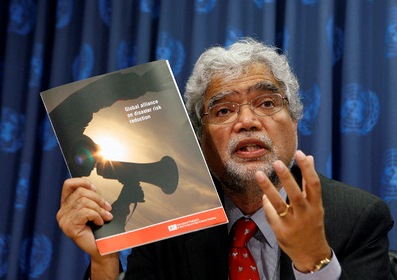Former UN envoy says mass killing in Darfur could have been avoided
October 24, 2013 (NEW YORK) – Former United Nations representative in Sudan, Mukesh Kapila, slammed the position of the international community on Darfur crisis and denounced its failure to prevent the mass killing of civilians there since the early stages of the conflict.

Speaking at Columbia University in New York on Wednesday, he provided the audience with a very insightful yet astonishing facts about the “deficiency and complicity of the international system that betrayed the people Darfur since the early stages of the genocidal campaign”.
He said the “Darfur genocide was avoidable if there was an international political will”. He further emphasized that the UN’s secretariat and the Department of Political Affairs (DPA) in New York as well the key international players knew in detail that the genocide was occurring In Darfur in 2003/4.
“They didn’t intend to act to stop it, because the key players of the international community were focusing on the peace process between the North and South Sudan”, he stressed.
The former UN official said he was surprised that no single official within the international system paid the price of the mistakes and inaction that led to the genocide in Rwanda or the unfolding genocide in Darfur. “On contrary, many of these international officials were promoted” he said.
Kapila underscored that the international response to Darfur in every aspect has been a total failure:
He said the hybrid peacekeeping mission (UNAMID) has failed to carry out its mandate and protect the civilians in Darfur. Kapila went further to describe the political leadership of the Mission as “a tool for the Bashir’s regime”
On the other hand, Kaplia strongly criticized the African Union (AU) and its High-Level of Implementation (AUHIP) for appeasing and protecting Bashir. Kapila branded the AUHIP’s efforts as “flawed and biased that were aiming at legitimizing and validating Bashir’s regime”.
Kapila who is the Special Representative for the Aegis Trust for the prevention of crimes against humanity published recently a book titled “Against A Tide of Evil” where he speaks in depths about the circumstances and responsible of “the final solution in Darfur” .
UN agencies estimate that up to 300 000 people have died and other 2,7-million forced to flee their homes in Darfur as a result of the Darfur conflict during 2003-2006 period, while Khartoum says only 10 000 people have died.
The former diplomat was hosted by the Two Sudans Project of the Program on Peace-building and rights at the Institute of the Study of Human Rights (ISHR) of the Columbia University.
The Director of the Program on Peace-building and Rights and Co-chair of the Two Sudans Project, David Phillips, regretted in his opening remarks, the ” on-going genocide” in Darfur and the gross violations of human rights in many parts of Sudan.
Phillips also said dismayed about the weak response and lack of action by the regional and international community vis-à-vis the critical humanitarian and human rights situation in Sudan.
The discussion was moderated by Ahmed Hussain Adam, a Visiting Scholar and Co-chair of the Two Sudans Project at Columbia University.
(ST)
